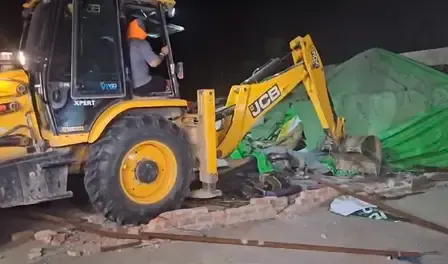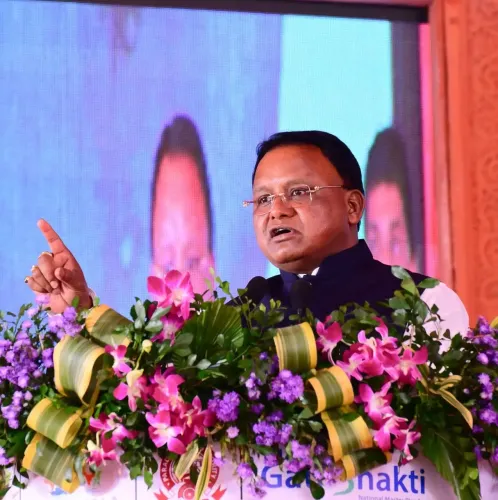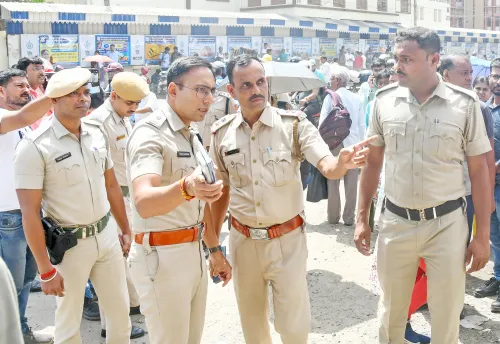Police Clear Barricades at Punjab-Haryana Border After Evicting Farmers

Synopsis
Key Takeaways
- Police evict farmers from Punjab-Haryana border.
- Barricades removed to allow traffic flow.
- Over 300 protesters detained, including union leaders.
- Government to continue discussions with farmers.
- Economic growth emphasized by Punjab officials.
Chandigarh, March 20 (NationPress) Following the eviction of farmers who had been engaged in a sit-in protest for more than a year and had erected temporary structures at two vital crossings between Punjab and Haryana, the police employed bulldozers to dismantle the concrete barricades that had been established to limit farmers' mobility.
In a significant operation, after apprehending several union leaders, including Jagjit Singh Dallewal and Sarwan Singh Pandher, on Wednesday evening, the Punjab Police utilized mild force to disperse the crowd at the Shambhu and Khanauri protest sites on the Punjab-Haryana border.
Later that night, the Haryana Police also removed the preventive barricades; however, traffic on the highways at both border locations remains halted.
The police encountered minimal resistance and detained over 300 protesters, including a 28-member delegation, just hours after the third round of discussions with the Central government panel concluded in Chandigarh.
During the meeting, Union Agriculture Minister Shivraj Singh Chouhan reaffirmed the Centre’s dedication to farmers' welfare. The next meeting is set for May 4.
The national highways had been obstructed since February 13, 2024. Following the removal of the protesters, police began to take away tractor-trailers stationed at both the Shambhu and Khanauri borders.
Of those detained, around 200 farmers were held at Khanauri and more than 100 at Shambhu. Internet and electricity services were briefly suspended in and around both protest areas.
In a statement to the media on Wednesday, Senior Superintendent of Police Nanak Singh noted that farmers had been protesting at Shambhu for an extended period. "Today (March 19), with the presence of Duty Magistrates, the police cleared the area after issuing appropriate warnings. Some individuals expressed willingness to return home. Additionally, the structures and vehicles are being removed. The entire road will be cleared for traffic soon."
BJP leader and Union Minister Ravneet Bittu communicated with Haryana Chief Minister Nayab Singh Saini regarding clearing the route as the Punjab government removed farmers from the borders.
After discussions with farm leaders on Wednesday, Union Minister Chouhan informed the media in Chandigarh that the talks were constructive and would continue. The farmer leaders reiterated their longstanding demands, including a legal assurance on the minimum support price (MSP) for crops.
The government and the farmers engaged in a productive and cordial dialogue lasting over three hours, during which various legal, economic, and other facets of the farmers' demands were examined, an official statement detailed.
Chouhan was accompanied by Cabinet colleagues Pralhad Joshi and Piyush Goyal, while Punjab's representation included Agriculture Minister Gurmeet Singh Khudian. Farmer leaders, including Jagjit Singh Dallewal, were also present.
As a result of the discussions, the government has resolved to hold consultations with farmer organizations nationwide, along with state and union territory governments, and other stakeholders, including traders, exporters, and the food processing sector.
It has been agreed to maintain dialogue in a positive spirit following the stakeholder consultations.
Punjab Finance Minister Harpal Cheema justified the government's actions, stating that this step was vital for the state's economic advancement.
"It is crucial that we also combat unemployment," he added.
Prior to the police action, Aam Aadmi Party (AAP) MP Malvinder Singh Kang urged for a collaborative and constructive approach to address the ongoing challenges faced by farmers.
He pointed out that the borders of Punjab have been blocked for over a year, resulting in considerable economic downturns, diminished investments, and a drop in tourism.
"The closure of Punjab’s borders, particularly at Shambhu, has not only caused economic difficulties but has also impacted religious tourism. The number of devotees visiting sacred sites such as Darbar Sahib has decreased. Moreover, the most significant challenge is the lack of investment, which is directly linked to industrial growth and job creation. This is a critical issue, as unemployment is one of the primary causes of drug abuse in Punjab," he added.









